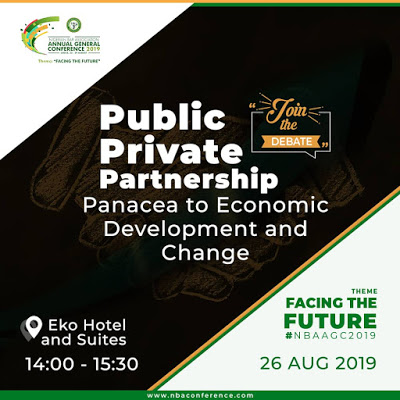
Public-private partnerships
involve collaboration between a government agency and a private-sector company
that can be used to finance, build, and operate projects, such as public
transportation networks, parks, and convention centers. Popular PPPs in Nigeria
include the Muritala Mohammed Airport (MM2) in Lagos, the Lekki – Epe Expressway
and the Ikoyi – Lekki link bridge in Ikoyi, Lagos.
involve collaboration between a government agency and a private-sector company
that can be used to finance, build, and operate projects, such as public
transportation networks, parks, and convention centers. Popular PPPs in Nigeria
include the Muritala Mohammed Airport (MM2) in Lagos, the Lekki – Epe Expressway
and the Ikoyi – Lekki link bridge in Ikoyi, Lagos.
The most important advantage
of PPPs is the alternative it provides for government to find alternative
funding for infrastructure. Recently, Nigeria’s Vice President, Prof. Yemi
Osibajo stated that Nigeria needs over a trillion naira to cover its
infrastructural deficit with this current administration claiming that it has
spent about $10 Million on infrastructure within the past 4 years[i].
of PPPs is the alternative it provides for government to find alternative
funding for infrastructure. Recently, Nigeria’s Vice President, Prof. Yemi
Osibajo stated that Nigeria needs over a trillion naira to cover its
infrastructural deficit with this current administration claiming that it has
spent about $10 Million on infrastructure within the past 4 years[i].
Public-private partnerships typically have contract periods of
25 to 30 years or longer. Financing comes partly from the private sector but
requires payments from the public sector and/or users over the project’s
lifetime. The private partner participates in designing, completing,
implementing, and funding the project, while the public partner focuses on
defining and monitoring compliance with the objectives. Risks are distributed
between the public and private partners according to the ability of each to assess,
control, and cope with them[ii].
25 to 30 years or longer. Financing comes partly from the private sector but
requires payments from the public sector and/or users over the project’s
lifetime. The private partner participates in designing, completing,
implementing, and funding the project, while the public partner focuses on
defining and monitoring compliance with the objectives. Risks are distributed
between the public and private partners according to the ability of each to assess,
control, and cope with them[ii].
Private-sector technology and
innovation, for example, can help provide better public services through
improved operational efficiency. The public sector, for its part, provides
incentives for the private sector to deliver projects on time and within
budget. In addition, creating economic diversification makes the country more
competitive in facilitating its infrastructure base and boosting associated
construction, equipment, support services, and other businesses.
innovation, for example, can help provide better public services through
improved operational efficiency. The public sector, for its part, provides
incentives for the private sector to deliver projects on time and within
budget. In addition, creating economic diversification makes the country more
competitive in facilitating its infrastructure base and boosting associated
construction, equipment, support services, and other businesses.
There
are downsides, too. Physical infrastructure, such as roads or railways, involve
construction risks. If the product is not delivered on time, exceeds cost
estimates, or has technical defects, the private partner typically bears the
burden. With regard to the advantages and opportunities available to Nigeria by
virtue of PPP Agreements, it is safe to say that PPP will be a panacea to
economic recovery and development in Nigeria.
are downsides, too. Physical infrastructure, such as roads or railways, involve
construction risks. If the product is not delivered on time, exceeds cost
estimates, or has technical defects, the private partner typically bears the
burden. With regard to the advantages and opportunities available to Nigeria by
virtue of PPP Agreements, it is safe to say that PPP will be a panacea to
economic recovery and development in Nigeria.
This and much more would be discussed
at the NBA Annual General Conference coming up between the 23rd and
29th of August, 2019. Do ensure you participate in this session.
at the NBA Annual General Conference coming up between the 23rd and
29th of August, 2019. Do ensure you participate in this session.
@Legalnaija
[i] Premium Times . (2018 ). Buhari govt
has invested $10bn in infrastructure — Osinbajo. Available:
https://www.premiumtimesng.com/business/business-news/269403-buhari-govt-has-invested-10bn-in-infrastructure-osinbajo.html.
Last accessed 2nd August, 2019.
has invested $10bn in infrastructure — Osinbajo. Available:
https://www.premiumtimesng.com/business/business-news/269403-buhari-govt-has-invested-10bn-in-infrastructure-osinbajo.html.
Last accessed 2nd August, 2019.
[ii] Will Kenton . (2019). Public
Private Partnerships . Available:
https://www.investopedia.com/terms/p/public-private-partnerships.asp. Last
accessed 3rd August, 2019 .
Private Partnerships . Available:
https://www.investopedia.com/terms/p/public-private-partnerships.asp. Last
accessed 3rd August, 2019 .
